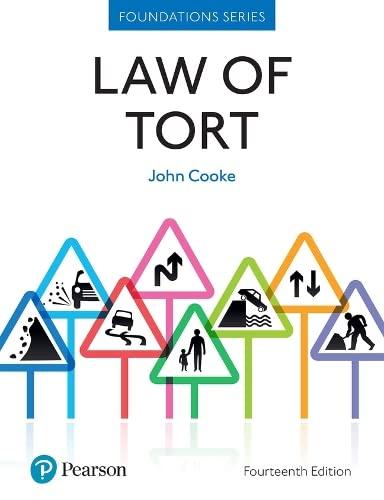Question
7. Another example is the case of HOUSEHOLD FIRE ANDCARRIAGE ACCIDENT INSURANCE CO. V GRANT (1879)where the defendant handed a letter of applicationfor shares to
7. Another example is the case ofHOUSEHOLD FIRE ANDCARRIAGE ACCIDENT INSURANCE CO. V GRANT(1879)where the defendant handed a letter of applicationfor shares to the plaintiff company's agent in Swansea with the intention that it should beposted to the company in London. The company posted an acceptance (letter of allotment) which was lost in the post, and never arrived. The defendant was called upon to pay the amount outstanding on his shares. The contract between the company and him had been formed when the letter of allotment was posted, regardless of the fact that it was lost in the post. Therefore the defendant doesn't have to pay.
(a) True
(b) False
8. Under the common law, a contract is an agreement that is intended to have legal consequences. Whether or not an agreement is intended to have such consequences is not always easy to determine. Generally, under the common law, agreements of a pure social or domestic nature are not contract. However, there are some 'domestic' agreements which do create legal obligations. For example in SIMPKINS V PAYS the Court held that:-
(a) there was no intention to create legal relations. Evidence showed there was a joint enterprise and the parties are expected to share any price won in the competition. It was not a mere domestic arrangement.
(b) there was an intention to create legal relations. Evidence do not showed there was a joint enterprise and the parties are expected to share any price won in the competition. It was not a mere domestic arrangement.
(c) there was an intention to create legal relations. Evidence showed there was a joint enterprise and the parties are expected to share any price won in the competition. It was a mere domestic arrangement.
(d) there was an intention to create legal relations. Evidence showed there was a joint enterprise and the parties are expected to share any price won in the competition. It was not a mere domestic arrangement.
9. In another case of PARKER V CLARK, the Court held that:-
(a) there was no intention to create legal relations between the Clarks and the Parkers, and damages were awarded to the Parkers.
(b) there was an intention to create legal relations between the Clarks and the Parkers, and damages were not awarded to the Parkers.
(c) there was an intention to create legal relations between the Clarks and the Parkers, and damages were awarded to the Parkers.
(d) there was no intention to create legal relations between the Clarks and the Parkers, and damages were not awarded to the Parkers.
Step by Step Solution
There are 3 Steps involved in it
Step: 1

Get Instant Access to Expert-Tailored Solutions
See step-by-step solutions with expert insights and AI powered tools for academic success
Step: 2

Step: 3

Ace Your Homework with AI
Get the answers you need in no time with our AI-driven, step-by-step assistance
Get Started


